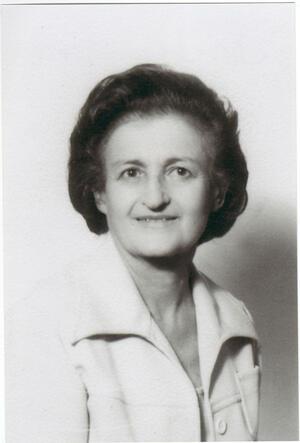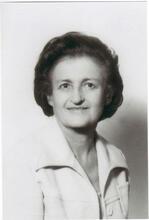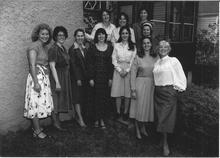Johanna Spector
Through her scholarship and the documentary films she produced, Johanna Spector preserved and popularized the music of Jewish communities around the world. After surviving the Holocaust, Spector immigrated to America, earned her doctorate from Hebrew Union College, and briefly taught at the Rubin Academy of Music in Jerusalem. Spector served as founding director of the Jewish Theological Seminary College of Music’s ethnomusicology department, devoting her career to discovering and preserving rare Jewish musical traditions from little-studied communities. She founded the Society for the Preservation of Samaritan Culture in 1971 and served as president of the Asian Music Society from 1974 to 1978. She collected over 10,000 recordings of religious and folk music and wrote extensively on Jewish musical traditions, continuing her work into her eighties.
The only one of her immediate family to survive the Nazi holocaust, Johanna Spector decided in the aftermath of World War II to devote herself to the study of Jewish music. Her ethnomusicological studies documented the culture of some of the most exotic of Jewish communities.
Early Life and Education
Johanna Spector was born on March 23, 1915, to timber merchant Jacob Chayim and his wife Anna (Meyer) Lichtenberg. Johanna and her older brother, Naum, enjoyed an upper-class childhood in Libau, Latvia. She was educated at home by private tutors, who included Hebrew in her studies. She married Robert Spector in 1939; he was killed by the Germans in December 1941. Her brother and parents were also killed. After surviving the war years in a series of concentration camps, Spector immigrated to the United States in 1947 and earned her doctorate from Hebrew Union College in 1950. She later earned a master’s degree at Columbia University in 1960. Spector served as a faculty member of the Rubin Academy of Music and as a research fellow at the Hebrew University of Jerusalem from 1951 to 1953, but returned to the United States and became a naturalized citizen in 1954. In that same year, she became a member of the faculty of the Jewish Theological Seminary of America, and she served as founder and director of the ethnomusicology department of the Seminary College of Jewish Music from 1962 through 1985. Spector was promoted to associate professor of musicology in 1966 and to professor in 1970. She was named professor emeritus in 1985.
Ethnomusicology Career
Spector was a highly regarded ethnomusicologist who held membership in a wide variety of professional associations: the American Anthropological Association; the American Musicological Society; the International Folk Music Council; the African Musician Society; the Society for Ethnomusicology, in which she served as New York City chapter secretary-treasurer from 1960 to 1964; and the Asian Music Society, in which she served as president from 1974 to 1978 and vice president since 1964. She founded the Society for the Preservation of Samaritan Culture in 1971.
Spector was the author of several books as well as a vast number of contributions to encyclopedias and professional journals, but her later professional activity was as a producer of documentary films. Her earliest film The Samaritans (1971) was followed by Middle Eastern Music (1973), About the Jews of India: Cochin (1976), The Shanwar Telis or Bene Israel of India (1978), About the Jews of Yemen, A Vanishing Culture (1986), and Two Thousand Years of Freedom and Honor: The Cochin Jews of India (1992). Spector also gathered a collection of over recordings of religious and folk music from the various communities she has studied.
Johanna Spector helped hundreds of students to understand the ancient cultures of non-Western Jewish communities. Her writings, recordings, and film projects documented the music of those now-shrinking communities for posterity. While interest in and performance of the music of Western communities predominated throughout the twentieth century, Johanna Spector’s pioneering studies of Eastern Jewish musical traditions shed light on a long-neglected but fascinating segment of the Jewish world.
Johanna Spector died on January 14, 2008.
Filmography
About the Jews of India: Cochin (1976).
About the Jews of Yemen: A Vanishing Culture (1986).
Middle Eastern Music (1973).
The Samaritans: The People of the Sacred Mountain. Motion picture directed by Dan Wolman. (1971).
The Shanwar Telis or Bene Israel of India (1979).
Two Thousand Years of Freedom and Honor: The Cochin Jews of India (1992).
EJ; Nulman, Macy. Concise Encyclopedia of Jewish Music (1975).
Rosenblatt, Judith Turk, ed. Who’s Who in World Jewry: A Biographical Dictionary of Outstanding Jews (1987).
Who’s Who in America (1994).






